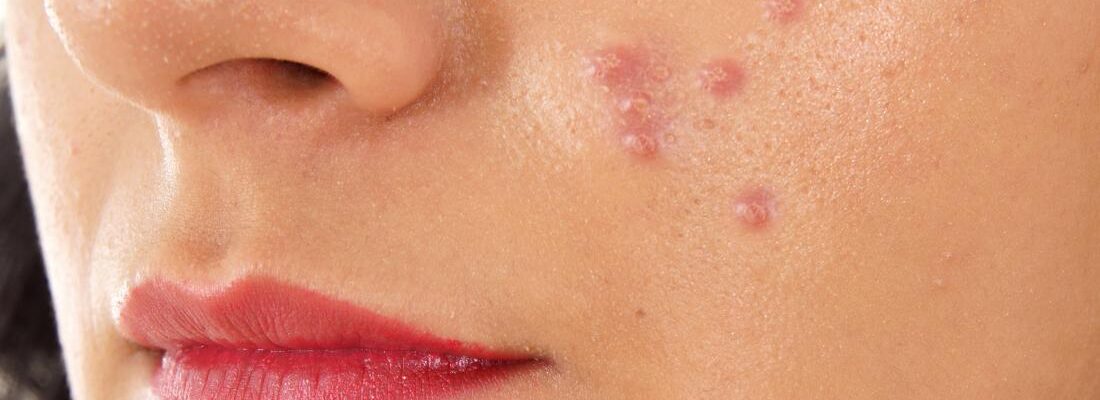Overview
Acne, commonly known as pimples, is a prevalent skin condition that occurs when hair follicles become clogged with oil, dead skin cells, and bacteria. It typically manifests as whiteheads, blackheads, pustules, or cystic lesions, often on the face, chest, back, or shoulders. While acne is most common among teenagers due to hormonal changes, it can affect individuals of all ages and often persists into adulthood for some.
The effects of acne extend beyond physical appearance. Severe or persistent cases can lead to scarring, hyperpigmentation, and changes in skin texture, which may affect a person’s self-esteem and mental well-being. Many individuals with acne report feelings of embarrassment, frustration, and social withdrawal, highlighting the emotional toll of the condition.
Treatment for acne varies depending on its severity. Mild cases are often managed with over-the-counter cleansers and topical treatments containing ingredients like benzoyl peroxide or salicylic acid. For more persistent or severe acne, dermatologists may prescribe retinoids, antibiotics, or hormonal therapies to address underlying causes such as bacterial overgrowth or hormonal imbalances. In severe cases, oral isotretinoin may be recommended.
Alongside medical treatments, lifestyle modifications such as maintaining a balanced diet, managing stress, and following a consistent skincare routine play a significant role in preventing breakouts. Advances in dermatology have also introduced innovative therapies like laser treatments and chemical peels, offering individuals a broader range of solutions to achieve healthier skin.
Table of Contents
When to See a Doctor
While mild acne can often be managed with over-the-counter treatments and proper skincare, there are situations where seeking medical advice is crucial. A dermatologist can provide personalized care and help prevent complications such as scarring or long-term skin damage. Signs to see a doctor:
- Persistent or Worsening Acne. If acne does not improve with over-the-counter treatments after several weeks or continues to worsen, it may indicate an underlying issue that requires prescription-strength medication or specialized care.
- Severe or Cystic Acne. Large, painful, or deep lesions, such as cysts and nodules, can lead to permanent scarring if left untreated. These cases often need interventions like oral isotretinoin or corticosteroid injections.
- Emotional Distress. Acne that causes significant embarrassment, anxiety, or depression is a valid reason to seek professional help. A dermatologist can not only treat the physical symptoms but may also recommend psychological support if needed.
- Unusual Symptoms. Acne accompanied by other symptoms, such as fever, unusual skin discoloration, or non-healing sores, could indicate an infection or a different medical condition that needs immediate attention.
- Hormonal Fluctuations or Changes. Women experiencing acne flare-ups due to hormonal changes, such as during menstruation, pregnancy, or menopause, may benefit from hormonal therapies like oral contraceptives or anti-androgen medications.
Addressing acne promptly with the help of a professional can improve skin health and minimize both physical and emotional impacts. Early intervention ensures better outcomes, especially for severe cases or those unresponsive to standard treatments.
What Type of Doctor to Seek
For treating acne, a dermatologist is the most qualified type of doctor to consult. Dermatologists are medical specialists trained in diagnosing and managing conditions that affect the skin, hair, and nails, including acne. They have expertise in understanding the underlying causes of acne, such as hormonal imbalances, bacterial overgrowth, or genetic predispositions, and can tailor treatments to suit individual needs. Whether the acne is mild or severe, a dermatologist can provide a range of options, from topical and oral medications to advanced therapies like chemical peels, laser treatments, or isotretinoin.
In cases where acne is influenced by hormonal factors, such as in adult women or those with polycystic ovary syndrome (PCOS), consulting an endocrinologist in addition to a dermatologist may be beneficial. An endocrinologist specializes in hormones and can identify and manage conditions contributing to acne. Collaborating with these specialists ensures a comprehensive approach to treatment, addressing both the external symptoms and internal triggers of the condition.
What to Expect from Your Visit to a Doctor
When visiting a doctor for acne, you can expect a thorough assessment of your skin and a discussion about your medical history. The doctor will examine the type, severity, and distribution of acne lesions, as well as any signs of scarring or pigmentation. They may ask questions about your skincare routine, diet, stress levels, and any prior treatments you’ve tried. For women, they might inquire about menstrual cycles or other hormonal changes to determine if hormones are playing a role in the condition.
Based on this evaluation, the doctor will recommend a treatment plan tailored to your needs. This could include prescription medications like topical retinoids, oral antibiotics, or hormonal therapies, depending on the severity of the acne. For severe cases, additional procedures like chemical peels, extractions, or laser treatments may be suggested. The doctor might also educate you on proper skincare techniques and lifestyle changes to complement medical treatments. If needed, follow-up visits will be scheduled to monitor progress and adjust the treatment plan for optimal results.
Pimples (Acne) Treatment Options

Image Source: www.freepik.com
There are many ways to treat acne, but it is important to consult a dermatologist to ensure the treatment is appropriate for your specific condition. Avoid self-medicating or using treatments mentioned here without professional guidance, as improper use could worsen the condition. A dermatologist will assess your skin and recommend the best course of action tailored to your needs. Below are some commonly used treatment options:
- Topical treatments. These are applied directly to the skin to target specific causes of acne:
- Antibacterial medications. These kill the Propionibacterium acnes bacteria, which is a primary cause of acne. Examples include clindamycin and erythromycin.
- Retinoids. These dissolve clogged pores and help prevent the formation of new comedones. Examples include tretinoin and adapalene.
- Benzoyl Peroxide. This works by killing P. acnes bacteria and also helps unclog pores.
- Oral medications. These are taken by mouth and are often used for moderate to severe acne:
- Antibacterial medications. Similar to topical antibiotics, these kill P. acnes bacteria but work systemically. Examples include tetracycline, minocycline, doxycycline, and erythromycin.
- Hormonal treatments. These reduce sebum production by regulating hormones. Examples include estrogen (found in some oral contraceptive pills), spironolactone, and dexamethasone.
- Prednisone. This anti-inflammatory medication is reserved for severe acne cases with significant swelling.
- Additional procedures. For certain cases, dermatologists may recommend physical or advanced treatments:
- Comedone extraction. Involves carefully opening and removing the contents of clogged pores without causing scarring.
- Intralesional corticosteroids. These are injected into severely inflamed areas to reduce swelling and promote healing.
- Chemical peels and dermabrasion. These procedures help improve skin texture and reduce scarring caused by acne.
Choosing the right treatment plan depends on the type, severity, and underlying cause of your acne. With proper care and guidance from a dermatologist, it’s possible to manage acne effectively and minimize its impact on your skin and confidence.
Pimples (Acne) Prognosis
The prognosis for acne varies depending on the type of treatment and the severity of the condition. Each option has its strengths, and outcomes often improve when treatments are used as prescribed and combined with consistent skincare. Below is an overview of the expected results for common acne treatments:
- Topical treatments. These are highly effective for mild to moderate acne, especially when used consistently. Improvements are usually noticeable within 4–8 weeks, although some redness or dryness may occur initially as the skin adjusts. Regular use helps prevent new breakouts and maintains clear skin.
- Oral medications. For moderate to severe acne, oral antibiotics can provide significant relief within a few weeks to months, reducing inflammation and bacterial overgrowth. Hormonal therapies, like oral contraceptives, are particularly effective for women with hormone-driven acne, but results may take 2–3 months to appear. Prednisone offers rapid improvement for severe inflammation but is typically a short-term solution to avoid side effects.
- Additional procedures. Physical treatments like comedone extraction and intralesional corticosteroids yield immediate results for specific lesions. Advanced procedures such as chemical peels and dermabrasion can significantly reduce scarring and improve skin texture over time, though multiple sessions may be required for optimal outcomes.
With the right approach, acne can often be controlled effectively, and long-term maintenance strategies can prevent relapses. Consulting a dermatologist ensures the best combination of treatments for lasting results and healthier skin.


